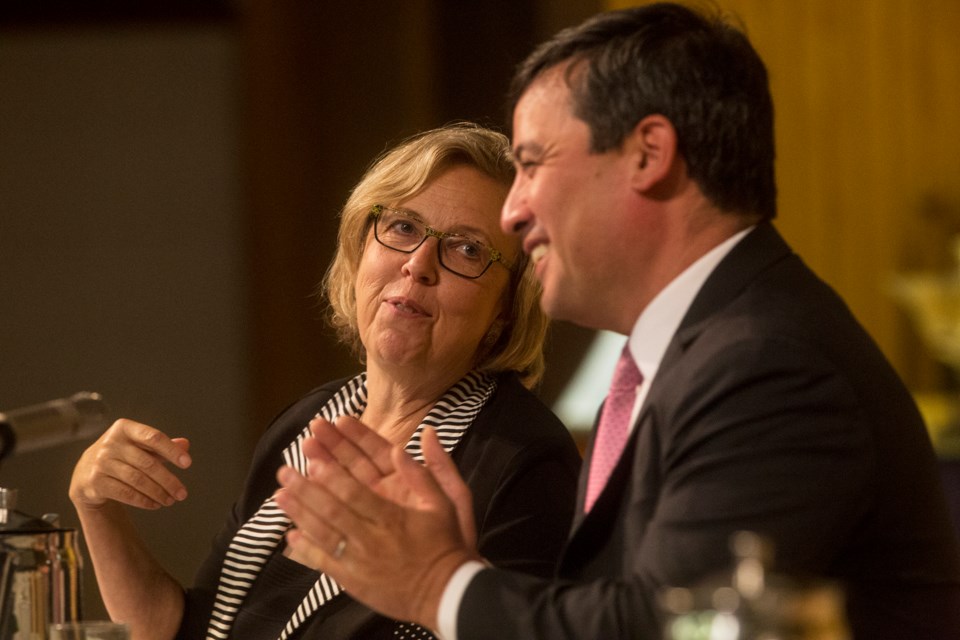Having the leader of the Green Party of Canada on the same panel as a Conservative member of Parliament speaking about how to improve the way government works in this country may seem like a bad idea, but the two sitting members of parliament engaged in a respectful discussion about the challenges currently facing democracy in Canada Tuesday in Guelph.
Michael Chong and Elizabeth May were among the speakers at an event called Turning Parliament Inside Out: Practical Ideas for Reforming Canada's Democracy, hosted by Fair Vote Guelph and Democracy Guelph.
Steve Dyck, a member of the organizing team for the event, said it was energizing to have two highly respected members of parliament speaking about reforms.
The parliamentary system as it stands undermines the ability of politicians to listen to each other and make the best decision for Canadians, said Dyck.
“Why is it that parliament is such a gong show? Why is it that we come up with policy and it goes one way for a while, then it goes the opposite direction?,” he asked, rhetorically.
Chong, the Conservative party of Canada MP for Wellington-Halton Hills, used his 20 minutes of speaking time to address parliamentary reform, specifically on how parliamentary committees are operated as, what he called, an extension of the Office of the Prime Minister and the opposition party leaders.
About 75 per cent of the work done in parliament is done in parliamentary committees, said Chong.
Each of those 24 parliamentary committees is made up of 10 members assembled proportionally from each of the three major parties — currently six Liberals, three from the Conservative Party and one NDP member.
“These 10 members are chosen by the party leaders and sit at the pleasure of the three party leaders — if a member of parliament on committee isn’t compliant with a leader’s wishes that member will be removed and replaced with another member — and that happens all of the time,” Chong told the audience.
Because of that, said Chong, members work at the whim of their party leaders and not the constituents who elected them.
Chong suggests stripping party leaders of the power to appoint committee members, instead filling those seats by secret ballot on the same day the House elects a Speaker.
“In doing so, we would suddenly have 24 committees where 10 members of Parliament on each committee would come together, take their jobs seriously and review government legislation, review government spending and hold the government ministers and departments accountable without having the fear of being pulled off committee because they weren’t being compliant with the leader’s wishes,” said Chong.
Although Elizabeth May represents the Green Party of Canada, Chong noted she is not able to sit on those 24 Parliamentary Committees because with only one member she is considered to be sitting as an independent.
May used her time at the podium to address the current first-past-the-post system of voting in Canada.
Prime Minister Justin Trudeau broke his election promise when he decided earlier this year to drop electoral reform, said May.
“I thought Justin Trudeau meant it when he said 2015 would be the last election in Canada held under first past the post. I really believed he meant it when word-for-word that commitment, starting with ‘in order to ensure that every vote counts, 2015 would be the last election held under first past the post’ appeared in the speech from the throne in December of 2015,” May told the crowd.
May said she was shocked when she learned the Liberal government would not pursue electoral reform.
Although she cannot sit on the standing committees, May was allowed to sit on the Special Committee on Electoral Reform.
Other systems of voting are feasible, said May, like the mixed-member proportional system used in Germany and New Zealand or the single transferrable vote system as seen in Ireland and on the Australian Senate.
May said she doesn’t want to see the country to run the risk of having an outlier party or leader with views that would never be held by the majority of Canadians holding a majority government.
“In Canada, if a prime minister has a majority of the seats in the House under their party banner, that prime minister controls automatically the executive and the legislative. That is the key reason I so desperately believe Canada needs to have a voting system that does not allow a big gulf to develop between the popular vote and the seat count,” she said.
After a question and answer period, 2014 provincial Wellington-Halton Hills NDP candidate Michael Carlucci was offered time to speak.
Guelph MP Lloyd Longfield was invited to speak at the event, but was unable to attend.
Chong said the system of government established in 1867 is very different from the system we have in place today.
One difference, said Chong, is that party leaders didn’t have any say as to who the party’s candidate would be at the local level.
“Guelphites determined who would run for each of the prospective parties and nobody from outside of Guelph could interfere with the selection of the Guelph party candidates,” said Chong to applause.
